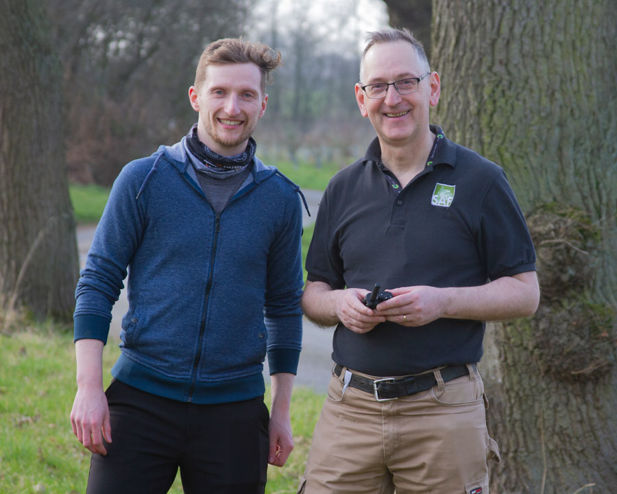Staff and student volunteers are helping trees survive ash dieback disease
 University staff member Thomas Snell and researcher Professor Rob MacKenzie
University staff member Thomas Snell and researcher Professor Rob MacKenzie
Birmingham’s large-scale forest research could help trees around the world.
In a sci-fi forest an hour from the University campus in Birmingham, the Birmingham Institute of Forest Research (BIFoR) is undertaking long-term research to see how our trees will react to climate change in the decades to come. Alongside it, a series of other experiments are underway to help the trees of today survive a major threat: ash dieback disease.
Can having a buddy help trees to thrive?
The team of researchers are studying ash trees that have been planted next to a broad range of ‘buddy’ trees, to investigate whether some species offer properties that can help ash trees next to them survive. Could one or two key species offer the most support by drawing up more water through the ground, offering more/less shade, attracting different insects etc?
Each tree needs a health check at the same time every year, so the BIFoR researchers can analyse the data to identify the best buddies. But with thousands of trees on site, the researchers can’t do it all alone.
University staff volunteer to help out
Birmingham staff member Fiona Newell used her annual day of volunteering provided by the University to help the team at BIFoR. ‘This was a great opportunity to get hands on helping our environment. The volunteer work was straightforward; measuring the trunks of the trees to see which had survived and even grown (with a cheer when we found those that were thriving!). It was great to feel part of a friendly team of researchers and students that is making a big difference and I’m already looking at going back again to help some more.’
Fellow staff member Thomas Snell says; ‘I hear about all the world-leading research my University does but I never thought I’d get a chance to help do it. I was brilliant to get trained on using the professional tools and to talk to researchers about the work they do.’
The difference it makes for researchers
Professor Rob MacKenzie of the BIFoR team explains the big difference volunteers make. ‘Together, staff and student volunteers measured over 3,600 trees in just four days, completing our third annual census of the ‘buddy’ planting. The measurements provide an essential evidence base, feeding directly into our advice to forest owners and the government. We look forward to sharing our findings as our results become clearer.’ Professor MacKenzie and colleagues have already begun to discuss the radical implications of the volunteer-powered work on buddy planting: see their recent position statement.
Find out how you could volunteer to support vital research or share your experience with students
Just a day of your time could make a huge difference to research, students and local communities. If you are inspired by the research taking place at Birmingham or want to help a student with their studies, get in touch to see how you could volunteer to support a cause close to your heart.